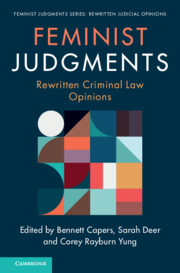9 results
Advisory Panel for Feminist Judgments Series
-
- Book:
- Feminist Judgments: Rewritten Criminal Law Opinions
- Published online:
- 01 December 2022
- Print publication:
- 15 December 2022, pp iv-iv
-
- Chapter
- Export citation
Notes on Contributors
-
- Book:
- Feminist Judgments: Rewritten Criminal Law Opinions
- Published online:
- 01 December 2022
- Print publication:
- 15 December 2022, pp xi-xx
-
- Chapter
- Export citation
Advisory Panel for Feminist Judgments: Rewritten Criminal Law Opinions
-
- Book:
- Feminist Judgments: Rewritten Criminal Law Opinions
- Published online:
- 01 December 2022
- Print publication:
- 15 December 2022, pp ix-x
-
- Chapter
- Export citation
Introduction and Overview
-
-
- Book:
- Feminist Judgments: Rewritten Criminal Law Opinions
- Published online:
- 01 December 2022
- Print publication:
- 15 December 2022, pp 1-4
-
- Chapter
- Export citation
Part II - Gender on Trial
-
- Book:
- Feminist Judgments: Rewritten Criminal Law Opinions
- Published online:
- 01 December 2022
- Print publication:
- 15 December 2022, pp 189-190
-
- Chapter
- Export citation
Contents
-
- Book:
- Feminist Judgments: Rewritten Criminal Law Opinions
- Published online:
- 01 December 2022
- Print publication:
- 15 December 2022, pp vii-viii
-
- Chapter
- Export citation
Copyright page
-
- Book:
- Feminist Judgments: Rewritten Criminal Law Opinions
- Published online:
- 01 December 2022
- Print publication:
- 15 December 2022, pp vi-vi
-
- Chapter
- Export citation
Part I - Gendered Justice
-
- Book:
- Feminist Judgments: Rewritten Criminal Law Opinions
- Published online:
- 01 December 2022
- Print publication:
- 15 December 2022, pp 5-188
-
- Chapter
- Export citation

Feminist Judgments: Rewritten Criminal Law Opinions
-
- Published online:
- 01 December 2022
- Print publication:
- 15 December 2022



